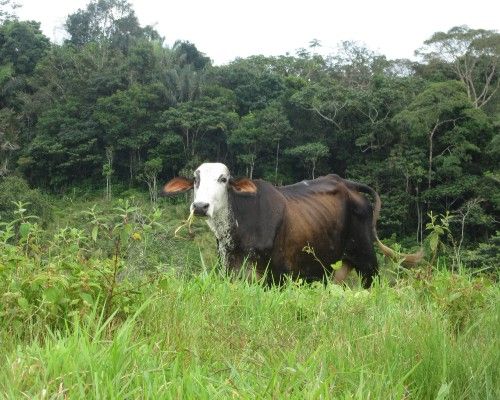By Matthew Jackson, Second Year, Biology
A project led by Bristol lecturer looks at the effects of new agricultural practices in rural Colombia, in a bid to help reach COP26 targets
Silvopastoral farming is a new frontier of agriculture that is being implemented in the Amazonian rainforest. It is defined as a pasture that supports a diverse fauna and flora, such as livestock, native shrubs, and trees, that are beneficial to both the farmer and the native ecosystem. By releasing less greenhouse gases than conventional intensive farming, silvopastoral implementation could help Colombia to reach its COP26 targets.
The effects of this new farming technique is currently being explored by BIOSMART, an international project led by Bristol Veterinary School lecturer Dr Maria Paula Escobar.
BIOSMART records the effects of silvopastoral methods on the economy, environment, and the people of Colombia. The project aims to understand the impact of silvopastoral farming, in the hopes that it will lead to a reduction in poverty, improve development in rural areas, reduce the environmental impact of current agricultural practices and diminish the need for deforestation.
Silvopasture emits 1.8 times less greenhouse gases than conventional agricultural land
However, Escobar stresses that this can only be undergone with the willing participation of the farmers, and the knowledge of implementers that deforestation is a problem created by political and historical conflict. Conflict that cannot be repeated for the sake of the Colombian and global population.
Current BIOSMART findings show that invertebrate communities in silvopasture are more like forest habitats than conventionally farmed land, helping support biodiversity. Silvopastoral farmland also has less plant-eating pests, implying the presence of greater numbers of predatory species that control the pest population. This decrease in pests would likely improve the yield and reduce the amount of money spent on pesticides.
Conventional farming promotes ecosystems consisting primarily of a single species of a plant, known as monocultures. In monocultures, the plant diversity is extremely low, but in silvopastoral land BIOSMART found more native plant species than in traditional pastures.
First major deal at COP26 climate summit sees 100 nations promise to end deforestation by 2030 and protect "lungs of our planet"#COP26BBC https://t.co/8As3QgLRLH
— BBC Breaking News (@BBCBreaking) November 1, 2021
Additionally, silvopasture emits 1.8 times less greenhouse gases than conventional agricultural land. However, silvopastoral plots are 66.5 times worse at storing carbon than undisturbed forests, and thus the priority is to stop the rate of deforestation.
A quarter of Colombia’s planted tree species are in the legume family: a family of plants that can increase the fertility of the soil by fixing nitrogen from the air into the ground through their roots. This means that the quality of soil in silvopasture can increase, which will improve the growth of surrounding crops.
BIOSMART has reported that if the current state of deforestation continues Colombia will not be on track to fulfil their COP26 targets by 2030, with a predicted 466.6 million tonnes of CO2 being released into the atmosphere over the next 10 years. Colombia’s emission budget is the amount of emissions the Colombian government has promised to keep below until 2030. At the current rate, deforestation alone will reduce the emission budget by 28 per cent.
Interview: Talking COP26, the climate crisis and university activism with co-leader of the Green Party Carla Denyer
Bristol graduate’s Bottle Farm begins to bloom
However, Escobar notes that if 75 per cent of current farmland in the region of Caquetá was converted to using silvopastoral practices, then Colombia’s emission budget for 2030 would save up to 7 per cent of possible emissions.
The potential for silvopasture farming in Colombia is yet untapped, but Bristol’s innovative research continues to explore whether a new approach to farming could be exactly what the country is looking for.
Featured Image: Epigram/University of Bristol
Do you think COP26 targets will be reached in time?






